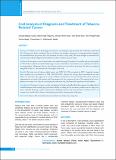Please use this identifier to cite or link to this item:
https://hdl.handle.net/20.500.14356/974| Title: | Cost Analysis of Diagnosis and Treatment of Tobacco-Related Cancer |
| Authors: | Chand, Ananda Bahadur Thagunna, Mohit Singh Shah, Bharat Vikram Bom, Amit Kumar Prasai, Devi Prasad |
| Citation: | ChandA. B., ThagunnaM. S., Shah B. V., BomA. K., & PrasaiD. P. (2023). Cost Analysis of Diagnosis and Treatment of Tobacco-Related Cancer. Journal of Nepal Health Research Council, 20(3), 720-725. https://doi.org/10.33314/jnhrc.v20i3.3744 |
| Issue Date: | 2022 |
| Publisher: | Nepal Health Research Council |
| Keywords: | Cancer direct medical costs non-medical costs tobacco use wage loss. |
| Series/Report no.: | July-Sep, 2022;3744 |
| Abstract: | Abstract Background: Tobacco use is the leading cause of cancer, accounting for approximately 20% of all cancer deaths and 70% of lung cancer deaths worldwide. The use of tobacco has multiple consequences; it damages health and pushes the household below the poverty line. The treatment of cancer is very costly. The study attempts to determine the cost associated with the diagnosis and treatment of tobacco-related cancer in Nepal. Methods: A descriptive cross-sectional study was conducted among 103 patients from public and private hospitals in 2019. Patients with the second and third stages of cancer who had ever used tobacco were randomly selected for the study purpose. All patients who met the inclusion criteria were selected for interviews. The data were analyzed using SPSS version 22, and summarized in descriptive form only. Results: The total cost of tobacco-related cancer was NPR 9,81,370 per patient in 2019. A patient's average direct medical cost was found to be NPR 5,88,740 (60%), whereas the average direct non-medical cost was NPR 1,23,147(13%). The wage loss as a result of illness accounted for over one–fourth (27%) of the total cost. Approximately one-sixth of the patients sold their property for the treatment of cancer. The majority of the cancer patients were found to be illiterate or with primary education only, and financially dependent on their families. Conclusions: Treatment of cancer is costly and patients in Nepal can hardly afford the expenses. Enrolling clients in health insurance and increasing the government subsidy by raising the tax on tobacco products can be a long-term source of health financing to protect patients from sliding into poverty. The increased price of tobacco due to an increase in tax would reduce tobacco consumption, particularly among youth and the poor. Keywords: Cancer; direct medical costs; non-medical costs; tobacco use; wage loss. |
| Description: | Original Article |
| URI: | http://103.69.126.140:8080/handle/20.500.14356/974 |
| ISSN: | Print ISSN: 1727-5482; Online ISSN: 1999-6217 |
| Appears in Collections: | Vol 20 No 3 Issue 56 july-Sep, 2022 |
Files in This Item:
| File | Description | Size | Format | |
|---|---|---|---|---|
| 3744-Manuscript-30782-1-10-20230314.pdf | fulltext download. | 206.89 kB | Adobe PDF |  View/Open |
Items in DSpace are protected by copyright, with all rights reserved, unless otherwise indicated.
